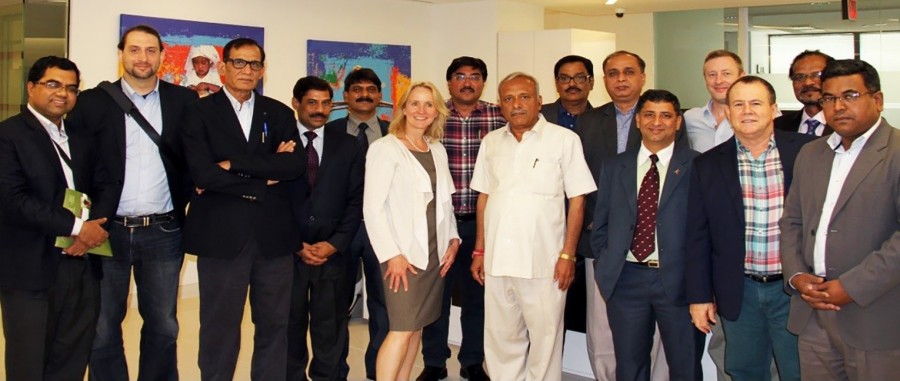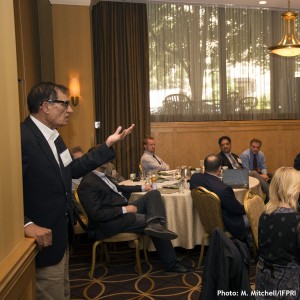Cross-Learning to Strengthen Agricultural Extension in South Asia
 In June, CSISA led a 10-member delegation of senior officials from National Agriculture Research and Extension Systems (NARES) from Bangladesh, India and Nepal to Washington, DC for a meeting with the Modernizing Extension and Advisory Services (MEAS), followed by a workshop entitled, ‘Strengthening Agricultural Research, Extension, and Input Markets in South Asia: Evidence from Regional and Global Practice,’ organized by International Food Policy Research Institute (IFPRI) and International Maize and Wheat Improvement Center (CIMMYT). MEAS, a USAID-funded initiative, helps to define and disseminate good practice strategies and approaches to establishing efficient, effective and financially sustainable rural extension and advisory service systems in selected countries.
In June, CSISA led a 10-member delegation of senior officials from National Agriculture Research and Extension Systems (NARES) from Bangladesh, India and Nepal to Washington, DC for a meeting with the Modernizing Extension and Advisory Services (MEAS), followed by a workshop entitled, ‘Strengthening Agricultural Research, Extension, and Input Markets in South Asia: Evidence from Regional and Global Practice,’ organized by International Food Policy Research Institute (IFPRI) and International Maize and Wheat Improvement Center (CIMMYT). MEAS, a USAID-funded initiative, helps to define and disseminate good practice strategies and approaches to establishing efficient, effective and financially sustainable rural extension and advisory service systems in selected countries.
The visit provided an opportunity to all the participants, working in close collaboration with National Agricultural Research Systems and International Agricultural Research Systems (IARS), to exchange ideas based on their diverse experiences of implementing extension services in different parts of the world. The theory of change model was highlighted during the deliberations for improving the performance of workforces in research-for-development in South Asia.
The workshop looked at addressing multiple questions that will help improve extension systems in South Asia. Are extension programs cost-effective in South Asia? Can new approaches empower smallholder farmers, particularly women? What performance indicators can researchers use to determine whether programs are successful? How can policies encourage farmers to adopt new technologies and practices without exhausting limited development funds?
Among a variety of other topics, participants discussed the effectiveness of subsidies to promote farmers’ adoption of agricultural inputs. Madhur Gautam, lead economist in Agriculture Global Practice at the World Bank, noted that the purported benefits only accrue under certain circumstances. Subsidies often remain in place long after their positive impacts have diminished, diverting scarce resources from other potential investments that may yield greater long-term returns, such as agricultural R&D and rural infrastructure.
In South Asia, subsidies were largely successful at addressing market failures during the early days of the Green Revolution. Yet market conditions in the region have improved considerably, and policymakers need to adapt their policies and investments accordingly.
Based on the discussions during the visit, specific issues were identified for further action and brainstorming to streamline research in the delivery process of agricultural technologies in South Asia. These issues included:
 The organization and structure of extension systems, as well as the constraints to their functioning, and changes needed to create improved and market-focused extension services by Krishi Vigyan Kendras (agriculture science center) in India and other extension agencies in South Asia
The organization and structure of extension systems, as well as the constraints to their functioning, and changes needed to create improved and market-focused extension services by Krishi Vigyan Kendras (agriculture science center) in India and other extension agencies in South Asia- The capacity of extension agencies to conduct trainings in a participatory manner with local contextual training material
- Ways to improve implementation monitoring and impact evaluation
- How local service providers could be strengthened through better linkages and communication in order to provide decentralized extension services
- How to make systems more equitable by linking gender and nutrition across extension programs and organizations.
Further, participants and their respective organizations from each country (Bangladesh, India and Nepal) will work with CSISA partners to focus on local research agendas in extension and innovations.
A team of seven participants from India was led by Dr. Ashok Kumar Singh, Deputy Director General (Agriculture Extension), Indian Council of Agriculture Research. Bangladesh was represented by Dr. Mohammad Zakir Hasnat, Agriculture Information Service and Sheikh Md. Nazim Uddin from Department of Agriculture Extension. From Nepal, Dr. Rajendra Adhikari, Joint Secretary, Ministry of Agricultural Development, participated.
In addition, the delegation toured the US Capitol building and met with Senator Mark Warner, head of the Indian Caucus in the US Senate.
Source: Excerpts from the summary of the workshop are posted on the IFPRI website. To read the full summary of the workshop, click here.
Tags: Bangladesh, India-news, MEAS, NARES, Nepal, south asia
